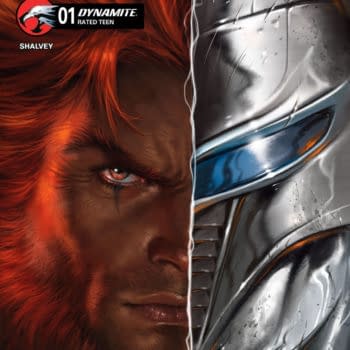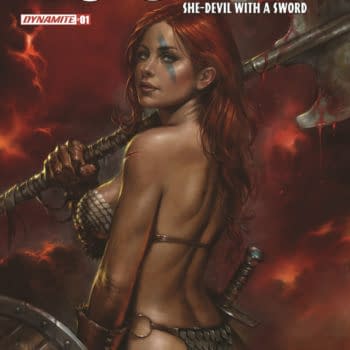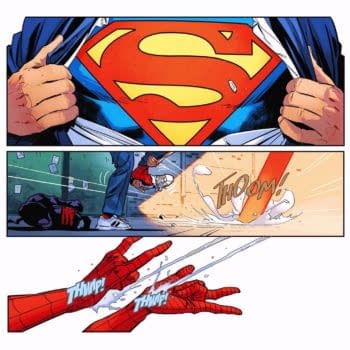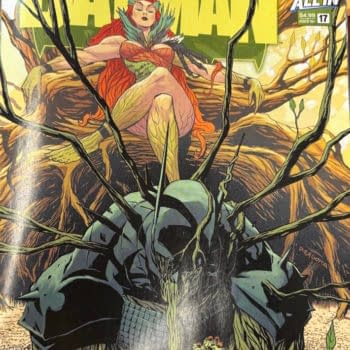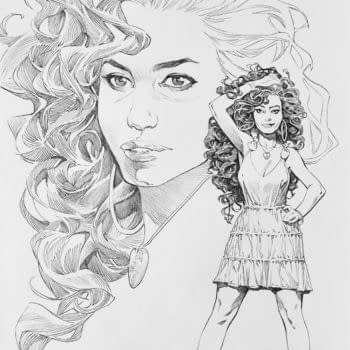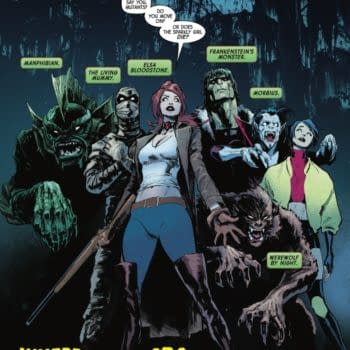Posted in: Comics, Recent Updates | Tagged: avatar, caligula, comcis, crossed, david lapham
SCOOP: David Lapham's Caligula From Avatar Press
Keith Davidsen writes for Bleeding Cool.
If you're a Little Bleeder, you've heard the name David Lapham quite a lot. As one of the most distinct voices in the comic book business, he's worked on such groundbreaking, gritty works as Stray Bullets, Young Liars, Detective Comics, Terror Inc., and Deadpool Max.
His latest completed work was the Crossed: Family Values limited series, frequently covered here at Bleeding Cool for its extreme and super-awesome content (if you haven't picked it up, then you're really missing out on some high-quality, bleeding-edge reading). As an immediate follow-up to Family Values, Lapham provided the no-holds-barred script for Crossed 3D, an original graphic novel to be released in January.
And now he's poised to expand his Avatar body of work with not one, but two new projects, launching in February and March. I recently had an opportunity to pick his brain, and see into the creative process behind his new projects. Check out yesterday's article for insight into his work on Crossed and the new series Crossed: Psychopath. Today's coverage is on Lapham's new series… Caligula! Caligula is a six issue, fully-painted series with art from newcomer German Nobile that launches in March 2011.
Keith Davidsen: How would you describe your upcoming project, Caligula?
David Lapham: The name Caligula is synonymous with depravity, insanity, abuse of power, and lust. Just about anything bad a leader could be, that's Caligula. So that's a great setting and starting point for an Avatar book. I would describe Caligula as the most horrific take imaginable on the subject of this infamous Emperor. It's definitely a horror book and there are some supernatural twists.
The story is about a young farmer named Junius whose family is raped and killed by Caligula and his guard. He comes to Rome looking for revenge, gets sucked into the Emperor's world and becomes horribly altered by it.
Keith Davidsen: Stray Bullets, Crossed, your work at DC and Marvel… much of your prior work has been set in contemporary times, in familiar settings. What inspired you to tell a story set in First Century Rome?
David Lapham: When William Christensen at Avatar asked me to do Caligula, one of the things that appealed was that it was a period piece, and that was something I've never done. It's a very interesting time. It's very early in Rome's succession of emperors beginning with Caesar and Augustus. When we think of Rome, this is what we think of, but in truth we were at the beginning of the end of the Roman Empire. This was also the time period just after Jesus was crucified. Literally that happened within a handful of years of Caligula's ascension. So there was a lot of history going on.
Keith Davidsen: With Caligula, you're dealing with an individual that, with the exception of only a few historical sources, has been lost to time. What resources did you turn to in order to make the Caligula series feel authentic?
David Lapham: Yes, that's one of the great things here. There's more rumor and speculation than historical fact. Even a scan of the internet will bring you ten different accounts of Caligula's life. There are a few basic landmarks of his life, but then it's just rumor after rumor. The histories that were written don't have much to go on. He lived with his great uncle Tiberius who was the Emperor. It's likely that Tiberius killed Caligula's father (who was a famous and beloved general) and brothers and exiled his mother, yet through that Caligula lived and became heir. Was he a great actor or a great suck-up? Did he kill his great uncle to take power or was it circumstance? When he became emperor, he was very popular and did a lot of swell stuff, but then he became sick and nearly died. Thereafter came the crazy rumors ranging from inserting his horse into the Senate, to opening a brothel in the palace, to sleeping with his sisters, and then raping the wives of his friends in the middle of dinner parties.
So in my approach, the first thing I knew was that I was going to take all the rumors as fact and ratchet it up from there. We have a break where Caligula seems to change or get rapidly worse, so this is where I can bring in the fictional elements I create and then dive into those speculations. Now being the genius that I am, I wouldn't bet against everything I'm writing being 100% true, at least as far as Caligula is concerned. It just doesn't make sense any other way.
The other aspect, more important than the facts of Caligula's life, was the general Roman life during this time. We want the book to feel authentic even in our fictional elements, the same as you would want your New York to be real in a detective story.
Keith Davidsen: To modern culture, Caligula is almost more recognized for being the subject of an infamous film (thanks to the controversial and disastrous 1979 flop starring Malcolm McDowell) than as an actual historic figure of note. Were you influenced by the film, or was it something you steered clear of during the creative process?
David Lapham: I only know of the film by reputation, but the bent on this Caligula is that it's a horror book, not a porno. There's going to be sex, orgies, and lots of killing in very sick ways, but my creative process wasn't from another fictional work. Rather, it was from historical elements of Caligula. This is a work of fiction and there's a supernatural twist to it, so we're clearly not telling a traditional bio of Caligula… unless we are. Maybe it's all true. I think it is.
Keith Davidsen: There's an extreme level of perversity, violence, and madness in Crossed, in Caligula, and even as an undercurrent in some of your more mainstream work like Tales of the Unexpected. What attracts you to tell stories of such extreme atmospheres?
David Lapham: Hmm… To me, what makes something interesting is going out there with it. Take it as far as I can go. Why wouldn't you want to let your imagination go? Why would you want to make something middle of the road? I do like to create a pocket space for my characters, someplace I can take over and put the characters through their paces. So if I'm doing Stray Bullets, I'll create my own town. In Young Liars, I went for a complete head trip, not half a head trip. Not 80% of a head trip. With Crossed and Caligula – both horror books – I don't want it said that I held back. If I hold back, it's because I want to set you up for something terrible.
Wanting to tell emotional stories of human tragedy and misfortune has always come natural to me. I guess I have a lot pent-up inside, so I let it out. It's why I like telling stories about kids and young adults so much. Their emotions are raw. They haven't learned to be robots yet.
Keith Davidsen used to write comics, but then he learned to be a robot and went to work for The Man. Now he's back in the publishing arena as Avatar's point person for retailers and the media.
David Lapham is a really nice guy who tends to write lots of frightening stuff. You should buy his comics. Trust me, it's nifty.









